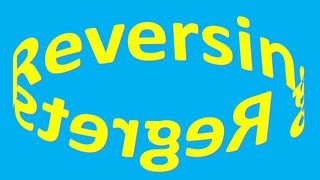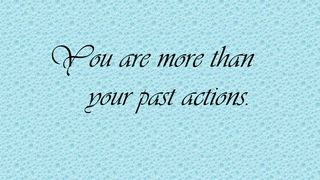Forgiveness
Conquering Your Regrets: Seven Suggestions for Self-Release
Are you living with regrets from your past? You need not carry the burden.
Posted July 16, 2018
Those two little words, "if only," can live within you for decades. You cannot build that time machine and re-do the past and so you might have a tendency to carry the past into the present, which can rob you of happiness, of thriving in your current circumstances. Sometimes, what happened in the past can influence how you act with others now. Do you have regrets?

Perhaps it is time to shrink those and even eliminate them from your life. We will be focusing on particular kinds of regrets, those in which you have violated your own moral standards. We will not focus on opportunities missed, which have no moral import, such as not having taken that desired trip to Europe when you were younger.
Here are seven suggestions for you:
1. Please make a list of all the regrets you have right now that are making you uncomfortable, in which you have broken your own moral standards. Try to list each, starting from childhood and moving toward your current situation. How many have you generated?
2. Let us next be sure that what you did in each case truly is worthy of the label regret and is not just an illusion from being too hard on yourself. How unjust was each of these actions that are leading to current regret? In an earlier post here on Psychology Today, I made a distinction between offending and harming. Have you offended yourself without harming yourself? Have you offended others by your actions without harming them? Which of the actions truly offended and harmed? Retain only the actions on the list that truly offended and harmed. So, on a 1-to-10 scale, with a 1 being no injustice at all and 10 being severe injustice, how unjust do you think you were in each case?
3. Rank these injustices from least to most severe. You now have an action plan for confronting the regrets borne out of the injustices.
4. Even though all of this took place in the past, you now can do something positive and active about each of these. You can forgive yourself. This will require that you start with the least offensive act on your list from #2 above. Try to forgive yourself first for this one issue. This includes seeing yourself as a worthwhile person, not because of what you did, but in spite of this. This can take time. The script in your mind could go something like this:

"I did wrong, but I am more than my actions. I have done moral good, I want to do good, and these, too, will define who I am. I am unique in this world and I have something to offer." Next, try to bear the pain of your actions so that you do not displace your disappointments or angers onto other people. Try to have empathy with yourself as an imperfect person...and realize that the imperfections do not definitively define you.
5. Focusing still on the least offensive act from #2 above, consider going to those whom you have offended and ask for forgiveness. Try to apologize, which takes both courage and humility. If you are a religious person, you can ask God for forgiveness even if the persons offended no longer are among the living.
6. Go now to the second issue on the list from #2 above. Do the same: try to forgive yourself and try to make things right with the ones who may have been hurt by your actions.
7. Work up the list until you have forgiven yourself for each issue. Stay at it—persevere until all issues on the list are confronted and overcome.

This will take time. At times, the regret will resurface and this is to be expected. Simply start again with the self-forgiveness process for this one event and have patience with yourself. Give yourself credit for the self-forgiveness already accomplished. You have forgiven yourself in the past and so this is evidence that you can do it again.
Seven approaches and seven opportunities to be free of regrets: It is time to be set free from the regrets of the past and now to thrive.


